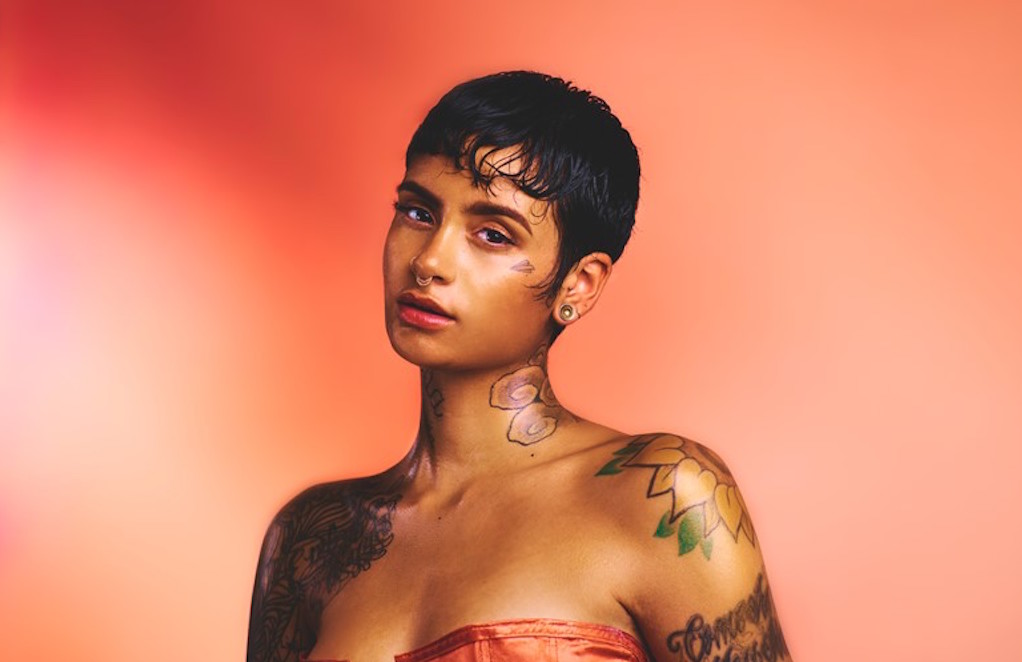In 2016, R&B as an industry revealed itself to be deeply image obsessed. You can trace this back to the rise of the Weeknd, who grew a sweet-sounding, disembodied coo into one of the most commanding and visible voices in pop. With his reign well established, last year felt like the culmination of Abel Tesfaye’s influence over the genre he was eventually able to transcend completely. Many of the year’s most heavily bankrolled R&B singers—dvsn, 6lack, H.E.R., 24hrs—emerged with fully-formed aesthetics that leaned heavily on an air of mystery, not to mention distinct post-Weeknd spellings or punctuations of their names that cemented the normalization of what was once artsy virtue signaling.
À la Tesfaye—who got his start independently but was quickly shepherded up the ladder by Drake—those artists paired their enigmatic allure with major superstar co-signs, such as Kendrick Lamar (H.E.R.), Ty Dolla $ign (24hrs), Kylie Jenner (6lack), and Drake again (dvsn). The suddenness with which these artists materialized was an indication of the music industry’s desire to invest money in incubating a replica of the Weeknd. dvsn, for instance, dropped its debut album on Drake’s label just six months after putting out its first ever song, while H.E.R.’s debut was rolled out with context-free links on some famous artists’ Twitter accounts, its major label backing only apparent if you read the small print on iTunes, leaving fans and journalists scrambling to find out anything about the singer.
In listening to these artists, it was easy to feel like the music itself had taken a backseat to the marketing plans. The singers were introduced to the public in meticulous fashions, but the songs, in most cases, felt empty. Like the Weeknd, each artist (dvsn aside) underscores their constructed anonymity with a sound that is hazy and faded, with the conjuring of a certain atmosphere foregrounded at the expense of noticeably strong songwriting. In fairness, this blueprint has been successfully replicated before—Bryson Tiller, a Drake soundalike who doubles as an athleisure mannequin in his spare time, became the genre’s breakout star in 2015 despite performing songs that sounded like they might be trying to escape back into your speakers. But at the conclusion of last year, these sorts of artists had piled up in a big heap at the end of the assembly line, like Christmas toys ready to be furiously packaged and shipped out for mass consumption.
The dawn of 2017 is at least providing an antidote. Kehlani Parrish is a 21-year-old singer from Oakland, though she is no stranger to the mechanics of the industry. She was courted by major labels, and recorded on one’s dime, before most fans knew who she was. She signed a deal prior to the spring 2015 release of her breakthrough mixtape, You Should Be Here, and long before it was nominated for a Grammy. (Streaming services don’t belie this narrative, advertising the record as self-released.) Last year, she collaborated with golden boys like Zayn and Charlie Puth, and was given a slot on the Suicide Squad soundtrack, which immediately birthed “Gangsta,” her first charting hit, if an unrepresentative one.
This is a more old school form of artist development, and Kehlani’s new album SweetSexySavage (released last Friday), is indeed a blow for a different kind of time-honored sort of ethos, one where songs that feel animated by a voracious musicality lunge at you aggressively with hooks. This can be seen most readily in a few of the album’s pre-release singles, “Distraction” and “Undercover,” which move diligently from smooth verses to tension-building pre-choruses, to big, blooming hooks. The album’s stunner, “Piece of Mind,” features a chorus so immediately engaging that the song instantly feels like a standard.
Still, though her songwriting is out of step with many of her peers, SweetSexySavage, which was written and produced largely with industry veterans Pop & Oak, is a distinctly contemporary album that is in conversation with trendy, critically acclaimed R&B. “Keep On” has the liquid groove of a Kaytranada record, but with audibly played bass (you can distinctly hear the strings squeaking) that gives it a meaty bottom end. “Everything is Yours” is a gaping, rattling FKA Twigs-esque composition that briefly disguises itself as a sugary song in the vein of The-Dream, while “Too Much” schools a legion of Aaliyah imitators by writing a skilled homage to one of her pop smashes (“More Than a Woman”) instead of simply fetishizing her discography’s mind-bending minimalism.
There is also something refreshing about Kehlani’s persona and the point of view she aims to convey. R&B at the moment feels very acidic. It’s mostly men, following in Drake’s footsteps, moping about their self-loathing, with brief excursions into singing about how they also hate many of the women in their lives, with the exception of the next one they might meet. Kehlani is open about her failings, too, but she doesn’t use them as a cudgel against her lovers, or as an excuse for why she’s going to find a new one. “Keep On,” for instance, is a song about being the shitty half of a relationship, but it comes from a place of empathy—“Anything you’re saying to me right now / You probably have the right to say”—which renders it in real and relatable terms, a gulf away from the asshole fantasies most R&B songs currently try and sell you.
SweetSexySavage presents the full spectrum of the adult experience, with songs about things like breakups (“Personal”), clandestine relationships (“Undercover,” “Distraction”), self-therapy (“Piece of Mind,” “Advice), lust (“Everything is Yours”), and being lusted over (“Do U Dirty). The sum of its scope results in an empowering record in which it’s easy to recognize one’s self. It is overly long, and Kehlani’s adherence to a kind of formalism means that some of the songs are cloying, like “Escape,” which has a chorus that starts to rot the tooth. But ultimately SweetSexySavage is a lovable and very human album that, if only briefly, does its part to pull R&B back to place where songs matter, first and foremost.





